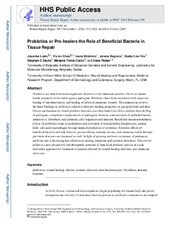| dc.creator | Lukić, Jovanka | |
| dc.creator | Chen, Vivien | |
| dc.creator | Strahinić, Ivana | |
| dc.creator | Begović, Jelena | |
| dc.creator | Lev-Tov, Hadar | |
| dc.creator | Davis, Stephen C. | |
| dc.creator | Tomić-Canić, Marjana | |
| dc.creator | Pastar, Irena | |
| dc.date.accessioned | 2022-11-15T14:50:59Z | |
| dc.date.available | 2018-12-01 | |
| dc.date.issued | 2017 | |
| dc.identifier.issn | 1067-1927 | |
| dc.identifier.uri | https://imagine.imgge.bg.ac.rs/handle/123456789/1042 | |
| dc.description.abstract | Probiotics are beneficial microorganisms, known to exert numerous positive effects on human health, primarily in the battle against pathogens. Probiotics have been associated with improved healing of intestinal ulcers, and healing of infected cutaneous wounds. This article reviews the latest findings on probiotics related to their pro-healing properties on gut epithelium and skin. Proven mechanisms by which probiotic bacteria exert their beneficial effects include direct killing of pathogens, competitive displacement of pathogenic bacteria, reinforcement of epithelial barrier, induction of fibroblasts, and epithelial cells' migration and function. Beneficial immunomodulatory effects of probiotics relate to modulation and activation of intraepithelial lymphocytes, natural killer cells, and macrophages through induced production of cytokines. Systemic effects of beneficial bacteria and link between gut microbiota, immune system, and cutaneous health through gut-brain-skin axes are discussed as well. In light of growing antibiotic resistance of pathogens, antibiotic use is becoming less effective in treating cutaneous and systemic infections. This review points to a new perspective and therapeutic potential of beneficial probiotic species as a safe alternative approach for treatment of patients affected by wound healing disorders and cutaneous infections. | en |
| dc.publisher | Wiley, Hoboken | |
| dc.relation | Brian V. Jegasothy Foundation, Department of Dermatology and Cutaneous Surgery University of Miami Miller School of Medicine, Ministry of Education, Science and Technological Development, Republic of Serbia | |
| dc.relation | National Institute of Health [1R01NR01564] | |
| dc.relation | info:eu-repo/grantAgreement/MESTD/Basic Research (BR or ON)/173019/RS// | |
| dc.relation | NATIONAL INSTITUTE OF NURSING RESEARCH [R01NR013881, R01NR015649] Funding Source: NIH RePORTER | |
| dc.relation.isversionof | https://doi.org/10.1111/wrr.12607 | |
| dc.rights | embargoedAccess | |
| dc.source | Wound Repair and Regeneration | |
| dc.title | Probiotics or pro-healers: the role of beneficial bacteria in tissue repair | en |
| dc.type | article | |
| dc.rights.license | ARR | |
| dc.citation.epage | 922 | |
| dc.citation.issue | 6 | |
| dc.citation.other | 25(6): 912-922 | |
| dc.citation.rank | M21 | |
| dc.citation.spage | 912 | |
| dc.citation.volume | 25 | |
| dc.description.other | This is the peer reviewed version of the paper: Lukic, J., Chen, V., Strahinic, I., Begovic, J., Lev-Tov, H., Davis, S. C., Tomic-Canic, M., & Pastar, I. (2017). Probiotics or pro-healers: The role of beneficial bacteria in tissue repair. Wound Repair and Regeneration, 25(6), 912–922. [https://doi.org/10.1111/wrr.12607] | |
| dc.identifier.doi | 10.1111/wrr.12607 | |
| dc.identifier.fulltext | https://imagine.imgge.bg.ac.rs/bitstream/id/13231/Peer_reviewed_version_Probiotics_or_Pro_healers_the_Role_of_Beneficial_Bacteria_in_Tissue_Repair_2018.pdf | |
| dc.identifier.pmid | 29315980 | |
| dc.identifier.scopus | 2-s2.0-85041548045 | |
| dc.identifier.wos | 000427602100001 | |
| dc.type.version | acceptedVersion | |

